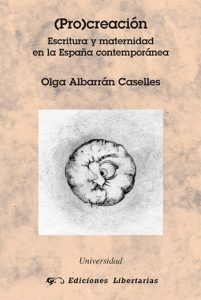Dr. Olga Albarran Caselles, Sessional Lecturer of Spanish, published a new book titled (Pro)creación. Escritura y maternidad en la España contemporánea (May 2022, Ediciones Libertarias). Here she elaborates on the inspiration behind it.
About the Book
“This book opens new lines of research for two topics that have been previously kept separate: motherhood and literary writing. They problematize Western binaries, showing instead the insoluble unity of the mind-body that creates and procreates.”


Book cover of (Pro)creación. Escritura y maternidad en la España contemporánea (May 2022, Ediciones Libertarias).
(Pro)creación is a book about writing and motherhood in contemporary Spain: it analyzes how three women authors have portrayed their relationship with procreation in their creative writing. In dialogue with autofiction, feminist theory, and recent discourse on reproduction, the book examines the (pro)creative process through a reading of three key texts: Silvia Nanclares’s autobiographical novel, Quién quiere ser madre (Who Wants to be a Mother, 2017); Carme Riera’s epistolary journal, Tiempo de espera (Time of Waiting, 1998); and Gabriela Wiener’s personal chronicle, Nueve lunas (Nine Moons, 2004).
Taking the point of view of a traditionally silenced subject, they help us reclaim the social and political dimensions of procreation, as well as long-ignored maternal agency, as a process that is both creatively productive and reproductive. I ask about the aims and methods of these texts, which all describe what it is like to be (or trying to be) a mother, and how they question the extent to which procreation has been placed at the service of masculine domination.
I employ three concepts to structure the book: desire, love and play. These concepts are connected both to the three texts and to different parts of the reproductive process. Nanclares’s novel is the account of a middle-aged woman who wants to get pregnant, navigating infertility and reproductive technologies, within a socioeconomic context that pressures women both to be mothers and to wait before conceiving. Riera offers the intimate diary of a mother expecting her second child, and the love letters she writes to her, challenging patriarchal ideas of passivity and rivalry between mother and daughters while exploring alternative affective practices. Finally, Wiener shows us a first-time mother’s playful journey into parenthood as she explores unconventional notions of pregnancy, reproduction and motherhood that aim to subvert norms regarding the female body and the reproductive practice.
This book opens new lines of research for two topics that have been previously kept separate: motherhood and literary writing. By connecting the two, these authors open up new expressive possibilities, challenging the androcentric idea of the subject, while focusing on the relational affective elements of pregnancy and the search for conception. They problematize Western binaries, showing instead the insoluble unity of the mind-body that creates and procreates.
Inspiration
“During my own pregnancy, I asked myself: why, despite being considered central to women's lives, is procreation often perceived as a secondary experience occupying a peripheral place, to say the least, in the cultural imagination?”
If any literary creation is born from a conflict, texts that arise from maternal ambivalence have all the ingredients to be considered universal literature, despite the fact that they have not yet found their place in the canon. During my own pregnancy, I asked myself: why, despite being considered central to women’s lives, is procreation often perceived as a secondary experience occupying a peripheral place, to say the least, in the cultural imagination? What could be the power of art in relation to reproduction? How could we resist or confront the pervasive normative discourses about reproduction and motherhood?
My research acknowledges the tensions and contradictions within reproductive discourses, as they are imposed on women and mothers (but questioned and subverted by the writers I study). Changing views on reproduction also help us to understand the transformations in Spanish society after Franco, the emergence of new literary forms, and the ongoing changes in our technological age.
Recent years have seen many books published on motherhood by authors who see the creative potential that such an event implies. These are texts in which motherhood takes a leading place: they are not only testimonials that speak to a formerly suppressed literary subject; they also seek a place within the literary canon. While procreation has been traditionally relegated to the silenced margins, this does not imply it has occupied an empty place. On the contrary, it has been an elastic and dynamic space that has prompted critical questions to open a discussion that cannot be longer deferred. This book seeks to keep this conversation alive and audible to replace the lethargic whispering where matters related to the maternal have been kept.
Acknowledgment
This project started as my PhD dissertation under the brilliant supervision of Jon Beasley-Murray, who always envisioned it as a book. Without his generosity, guidance and determined encouragement, it would not exist. Many more people supported me along the process: my family of origin and my chosen family, my PhD committee (with Anna Casas Aguilar and Raúl Álvarez Moreno), all my amazing friends and colleagues in the Department of French, Hispanic and Italian Studies and beyond, the UBC Faculty Association, the reviewers and publishers, and many, many more…
This book started ten years ago, when I was expecting my child. He has been the best of companions along the way, as well as a persistent interruption. The book is thus here thanks to him who, as he likes to remind me, was the one who made me a mother, or rather, as I tell him, who makes me think about why and how to mother.


